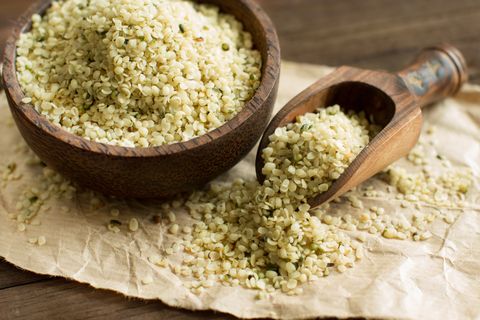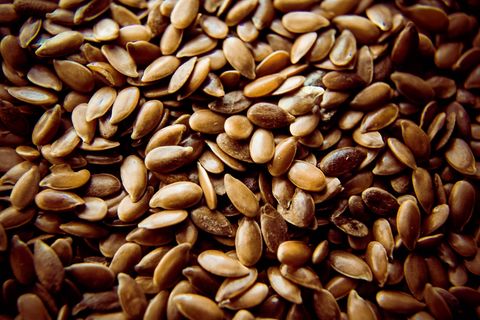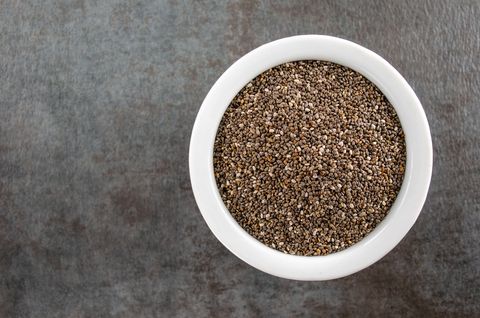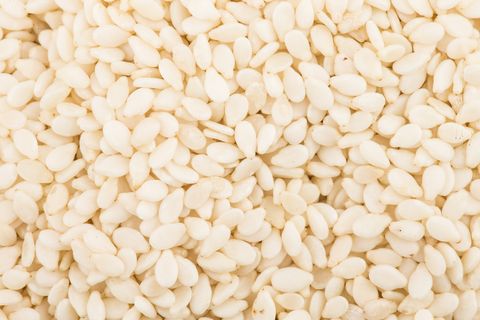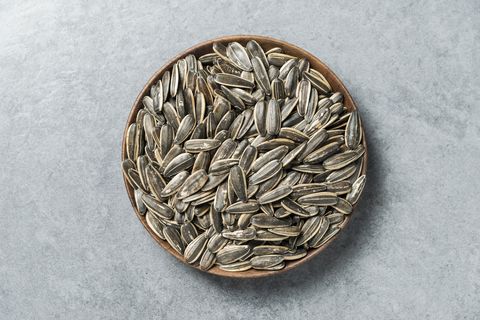The six best seeds to consume are listed below.
1. Hemp
Nutty-tasting hemp seeds are most often sold shelled and are also known as hemp hearts. In the seed world, they are a stand-out source of protein, offering nearly 10 grams in a 3-tablespoon serving. There is mounting research suggesting that consuming more protein from plants can help lower risk factors for heart disease, including high cholesterol numbers, especially when it displaces some of the red and processed meat in the diet.
According to Angie Asche, M.S., R.D., C.S.S.D., of Eleat Sports Nutrition and author of Fuel Your Body, hemp protein—especially when paired with other plant proteins, like pea, for an optimal amino acid profile—can help improve muscle recovery and growth from training. Other nutritional virtues of hemp seeds include healthy amounts of omega-3s, magnesium, B vitamins, and energy-boosting iron.
2. Flax
Flax seeds contain alpha-linolenic acid (ALA), a type of omega-3 present in certain plant foods. An analysis of data from 41 studies published in The BMJ linked a high intake of ALA to a 10 percent lower risk of early death from all causes, an 8 percent lower risk of early death from cardiovascular disease, and an 11 percent lower risk of early death from coronary heart disease, compared with lower consumption levels.
The nutritional overachievers are also one of the richest food sources of lignans—plant compounds with antioxidant and estrogen-like properties that may help lower the chances for certain cancers, including colorectal and breast. And, nearly all of the carbs in flax are in the form of fiber—there are 4 grams in a 2-tablespoon serving.
Flax seeds offer two types of fiber: soluble (dissolves in water and other body fluids) and insoluble (doesn’t dissolve in fluids and absorbs them instead), according to Russell. Insoluble helps act as a stool softener, preventing constipation, which is one of the most common GI complaints in America, she adds.
Russell stresses that flax seeds are best-consumed ground because the hard shell of the whole seed resists digestion and will likely pass through your system intact so you won’t absorb its nutrients. One caveat: Grinding starts to break down the oils in the seeds leading them to go rancid, so store ground flax in the fridge or freezer to maintain freshness.
3. Chia
Here’s more proof that good things come in small packages. As a fiber heavyweight, tiny chia seeds supply 10 grams in a 1-ounce serving—much of which is soluble fiber. An investigation in the European Journal of Clinical Nutrition found that the viscosity of soluble fiber in chia can temper blood sugar fluctuations and increase feelings of satiety.
“By absorbing fluids, soluble fiber slows down digestion, keeping you feeling fuller for longer and balancing blood sugar,” Asche says.
If you mix chia with liquid (such as milk or fruit juice), you’ll see how its soluble fiber forms a gel-like consistency, which is why they are used to make puddings and fruit jams. A number of research papers show that soluble fiber also helps lower levels of LDL cholesterol—a.k.a. “bad” cholesterol—making it protective against heart issues.
“Fiber binds to cholesterol molecules, which in turn, allows our bodies to excrete these molecules—versus allowing them to enter our bloodstream,” Asche explains.
Chia is another source of heart-healthy omega-3 fats and supplies useful amounts of the bone-benefiting minerals calcium and phosphorus. Both black and beige chia seeds are available, but important nutritional differences between the two have not been determined.
4. Sesame
Say “open sesame” and you’ll get a surprising dose of bone-building calcium. Asche stresses that proper dietary calcium intake is important for bone health among athletes, and sesame seeds prove that you can also get the mineral from non-dairy sources.
A compound unique to sesame seeds called sesamin may lower your risk of cancer, due to its anti-inflammatory actions in the body and the ability to slow the spread of cancerous cells. The tender seeds also pony up copper, a mineral that is essential for proper energy production and the formation of connective tissue (tissue that supports, protects, and gives structure to other tissues and organs) in your body.
Most sesame seeds in this country are sold with the seed coat removed (hulled), but the unhulled kind (sometimes labeled “natural” or “whole”) is available in some health food stores, which has a crunchier texture as well as higher levels of some nutrients—including calcium, iron, and copper. The less common black sesame seed variety can taste a little more bitter but contains anthocyanin antioxidants found within their dark hulls that have been shown to have benefits for brain functioning.
5. Sunflower
The nutritional clout of sunflower seeds includes laudable amounts of vitamin E, which is about 30 percent of your daily need in a 2-tablespoon serving. Acting as an antioxidant in the body, vitamin E promotes healthier aging and may even improve exercise recovery. Diet surveys suggest that most Americans aren’t getting nearly enough vitamin E, which makes sunflower seeds a great way to get what you need. Their collection of micronutrients also includes healthy amounts of selenium, which a recent study in the journal Nutrition found can help boost your mood.
For the most part, you want to select unsalted seeds to keep your sodium intake in check, but Russell says that after a sweaty ride the added salt can help you recover some of the electrolyte lost in sweat. “Athletes can lose over a day’s sodium needs in a single workout and replenishing that mineral is vital to health and future performances.”

